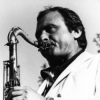Stan Getz

Stan Getz
Stanley "Stan" Getzwas an American jazz saxophonist. Playing primarily the tenor saxophone, Getz was known as "The Sound" because of his warm, lyrical tone, his prime influence being the wispy, mellow timbre of his idol, Lester Young. Coming to prominence in the late 1940s with Woody Herman's big band, Getz is described by critic Scott Yanow as "one of the all-time great tenor saxophonists". Getz went on to perform in bebop and cool jazz, but is perhaps best known for...
NationalityAmerican
ProfessionSaxophonist
Date of Birth2 February 1927
CityPhiladelphia, PA
CountryUnited States of America
My dark sound could be heard across a room clearer than somebody with a reedy sound. It had more projection. My sound always seemed to fill a room.
We recorded to document ourselves, not to sell a lot of records.
I learn something new every day - to edit, to take out all the extraneous matter and stress form, logic, and content. I try to play beautiful music.
I came from an era when we didn't use electronic instruments. The bass wasn't even amplified. The sound was the sound you got.
You know, when I'm playing, I think of myself in front of the Wailing Wall with a saxophone in my hands, and I'm davening, I'm really telling it to the Wall.
Switch to piano! No. Really, if you like an instrument that sings, play the saxophone. At its best it's like the human voice. Of course, it would be best if you could actually sing with your own voice. The saxophone is an imperfect instrument, especially the tenor and soprano, as far as intonation goes. Therefore, the challenge is to sing on an imperfect instrument or 'voice' that is outside of your body. I love that challenge and have for over forty-five years. As far as playing jazz, no other art form, other than conversation, can give the satisfaction of spontaneous interaction.
The saxophone is actually a translation of the human voice, in my conception. All you can do is play melody. No matter how complicated it gets, it's still a melody.
I appreciate men like Ben Webster and Coleman Hawkins very much.
I played in rhumba bands, mickey mouse bands; all kinds of bands.
I've done some dastardly things but what can I do except make amends and apologize?
You don't rehearse jazz to death to get the camera angles.
Records used to be documents, but now record companies want product.
I cannot play a lie. I have to believe in what I play or it won't come out.
When I got this saxophone, it became a religion. There wasn't TV, there wasn't much money, and there was just a real dedication.... I never thought of it as an art. It was just work that I loved. Not just work, but work that I loved. I loved it so much, I would play it if nobody listened to it. Any jazz musician, if there's nobody around to listen, would play just for the sheer joy of improvising music.